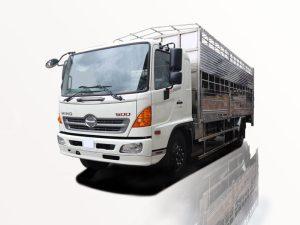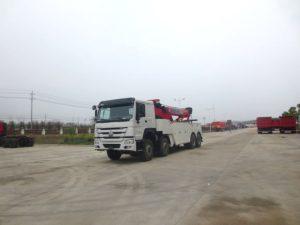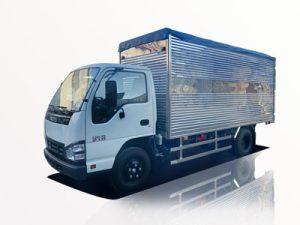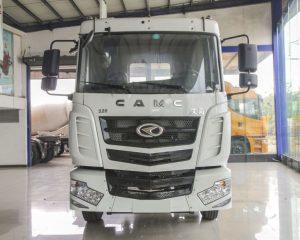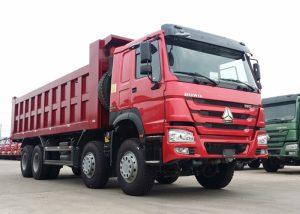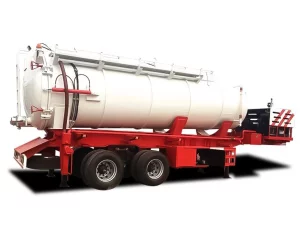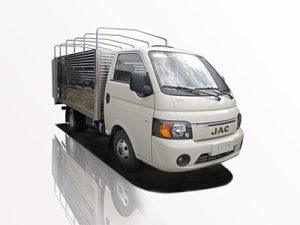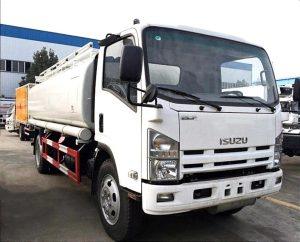Monday to Saturday - 8:00 -17:30
Understanding the Semi Trailer Van: A Comprehensive Guide
Introduction
As the backbone of the freight transport industry, semi trailer vans play a crucial role in the efficient movement of goods across the country and internationally. This comprehensive guide aims to shed light on various aspects of semi trailer vans, including their types, advantages, maintenance, and more. By the end of this article, you’ll have a thorough understanding of what semi trailer vans are, how they work, and their importance in logistics.
What is a Semi Trailer Van?
A semi trailer van, often referred to simply as a “trailer” or “van,” is a type of trailer with no front axle designed to be towed by a tractor unit. This configuration allows for great flexibility and increases the load-carrying capacity without requiring a larger vehicle. Semi trailer vans are commonly used in freight transportation to carry a variety of goods.
Components of a Semi Trailer Van
A semi trailer van consists of several key components:
- Chassis: The main structure that supports the entire trailer.
- Axles: These allow the trailer to roll; typically, there are two or more axles.
- Flooring: Usually made from plywood or treated wood to handle heavy loads.
- Body: The exterior structure which can be constructed from various materials, including aluminum or steel.
- Load Securing Systems: Includes tie-downs and other mechanisms to ensure cargo safety.
Types of Semi Trailer Vans
Understanding the different types of semi trailer vans is essential for selecting the right one for specific cargo needs.
1. Dry Van Trailers
These enclosed trailers are ideal for transporting non-perishable goods, providing protection from the elements.
2. Refrigerated Trailers (Reefers)
Reefers are used for transporting temperature-sensitive cargo such as food and pharmaceuticals. They are equipped with a refrigeration unit to maintain the desired temperature.
3. Flatbed Trailers
Flatbed trailers have no sides or roof, making them suitable for oversized or irregularly shaped cargo like machinery and building materials.
4. Conestoga Trailers
These specialized flatbeds come with a tarping system that can be opened and closed, providing a degree of protection while allowing for easy loading.
5. Tanker Trailers
Tankers are specifically designed for transporting liquids, ranging from fuel to chemicals. They come with safety features to prevent leaks and spills.
Benefits of Using Semi Trailer Vans
Semi trailer vans offer numerous advantages that make them indispensable in the logistics industry.
1. High Load Capacity
A single semi trailer van can carry a substantial amount of freight compared to other transport options, enhancing efficiency.
2. Flexibility
Given their design, semi trailers can be easily attached and detached from different tractor units, allowing businesses to adapt to varying loads and cargo types.
3. Cost-Effective Transportation
Transporting goods by semi trailer vans is usually more cost-effective, especially over long distances. The ability to carry more cargo per trip can lead to lower fuel and labor costs.
4. Safety Features
Modern semi trailer vans are equipped with advanced safety features including anti-lock brakes, electronic stability control, and more, enhancing road safety.
Maintenance Tips for Semi Trailer Vans
Proper maintenance is essential to ensure the longevity and efficient operation of semi trailer vans.
1. Regular Inspections
Conduct routine inspections focusing on brakes, tires, and lighting systems to catch potential issues early.
2. Tire Care
Maintain proper tire pressure and tread depth. Rotate tires regularly to ensure even wear.
3. Brake Maintenance
Check brake pads and discs for wear and replace them as needed. Ensure that the brake fluid is at the correct level.
4. Cleaning
Regularly wash the trailer to prevent rust and debris build-up, especially in the wheel wells and undercarriage.
5. Documentation
Maintain accurate records of all inspections and repairs to ensure compliance and inform future maintenance needs.
Advanced Technologies in Semi Trailer Vans
The logistics industry has seen a wave of technological advancements that boost the efficiency of semi trailer vans.
1. GPS Tracking
Many semi trailer vans are now equipped with GPS tracking systems that allow fleet managers to monitor delivery times and routes in real-time.
2. Telematics
This technology gathers data about the trailer’s operation, providing insights into fuel consumption, vehicle maintenance needs, and driver behavior.
3. Automated Braking Systems
Automated braking systems can significantly reduce the risk of accidents. They can detect obstacles and apply brakes if necessary.
4. Smart Load Monitoring
These systems allow drivers to monitor the weight and distribution of cargo, ensuring compliance with legal weight limits and improving safety.
Choosing the Right Semi Trailer Van for Your Business
Determining the appropriate semi trailer van for your needs involves several considerations.
1. Type of Cargo
Understand the nature of the goods you plan to transport. Different types of trailers suit different types of cargo.
2. Distance and Route
Consider the distance of trips and the type of terrain. Some trailers may perform better on specific routes.
3. Load Capacity
Evaluate the average weight of your cargo and choose a trailer that can accommodate that weight with some margin.
4. Cost-Benefit Analysis
Weigh the initial purchase cost against potential savings in operations to determine if the investment is worthwhile.
Regulations and Legal Requirements
Operating a semi trailer van requires adherence to various regulations that ensure safety and compliance.
1. Weight Regulations
There are federal and state regulations regarding the maximum weight limits for semi trailer vans, usually capped between 80,000 pounds when fully loaded.
2. Licensing Requirements
Drivers must have a Commercial Driver’s License (CDL) to operate a vehicle towing a semi trailer. Additional endorsements may be necessary for certain types of trailers.
3. Inspections and Maintenance Records
Many jurisdictions require regular inspections and well-documented maintenance records for commercial vehicles.
4. Health and Safety Regulations
Compliance with health and safety regulations is crucial, especially for refrigerated trailers transporting perishable goods.
Future Trends in Semi Trailer Vans
The semi trailer van industry is evolving rapidly with new trends shaping the future of freight transport.
1. Sustainability Initiatives
With growing concerns about environmental impact, many manufacturers are focusing on producing eco-friendly trailers and using sustainable materials.
2. Autonomous Technology
Self-driving semi trailers are in development, promising increased efficiency and safety on the road.
3. E-commerce Boom
The rise of e-commerce has led to an increased demand for faster delivery, affecting how semi trailer vans are utilized in logistics.
FAQ Section
1. What is the average cost of a semi trailer van?
The price for a semi trailer van can range from $30,000 to $100,000 depending on the type and features.
2. How long do semi trailer vans typically last?
With proper maintenance, a semi trailer van can last 10 to 15 years or more.
3. Can semi trailer vans be used for personal transportation?
While they can technically be used for personal transport, they are primarily designed for commercial freight hauling.
4. What are the weight limits for a fully loaded semi trailer?
The federal weight limit for a fully loaded semi trailer is typically 80,000 pounds, but this can vary based on state laws.
5. Are there any specific regulations for transporting hazardous materials?
Yes, transporting hazardous materials requires additional regulations, including specialized training, labeling, and certification of the driver and vehicle.
6. What features should I look for when purchasing a semi trailer van?
Consider factors such as weight capacity, type of cargo handled, price, and available safety features.


